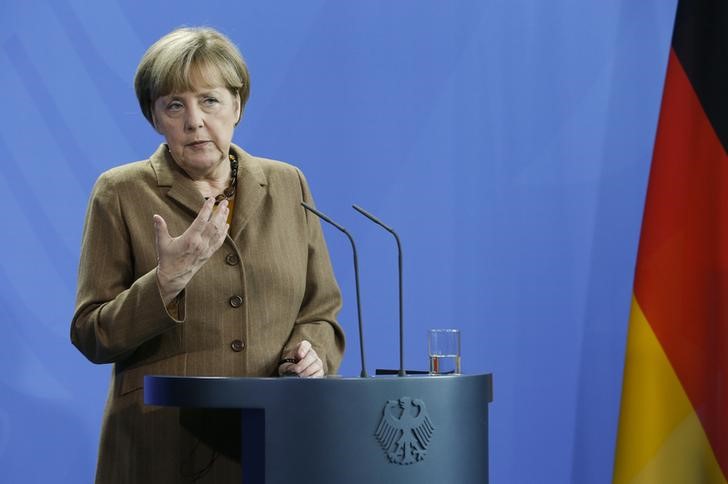By Kylie MacLellan
LONDON (Reuters) - German Chancellor Angela Merkel will give little ground on Wednesday as Prime Minister David Cameron seeks her help in curbing EU migration, insisting that free movement of workers is crucial to the bloc.
Cameron, whose Conservatives are losing support to the Eurosceptic UK Independence Party (UKIP) before an election in May, plans to raise his proposals on reforming the European Union when he meets Merkel in London to discuss Germany's presidency of the G7.
With immigration among voters' top concerns, Cameron wants to renegotiate ties with the EU before a referendum on Britain's membership of the bloc that he has promised by the end of 2017 if his party is still in power.
But while Merkel is sympathetic to cracking down on any welfare abuse by migrants, one of her allies made clear she would not yield on the right of EU workers to seek employment wherever they want in the 28-nation union.
"When Merkel visited London last year there was also the expectation that she would meet the demands of the British prime minister on changes to the EU treaty. She didn't do this then and she certainly won't do it now," said Gunther Krichbaum, head of the European Affairs committee of the German parliament.
Cameron has made controlling the flow of EU citizens to Britain a central part of his renegotiation effort. UKIP and some Conservatives say Britons fear that workers from poorer member states in central and eastern Europe are depressing wages, while others may be coming to collect more generous welfare entitlements than back home.
As the leader of the EU's most powerful state, Merkel's backing will be crucial if Cameron is to have any hope of getting the EU to agree to his proposals. But Krichbaum, a member of her Christian Democrat party, said the British leader should stand up to the Eurosceptics.
"Cameron is in a very difficult situation and is under a lot of pressure within his party. But he got himself into this situation. He is trying to match the demands of UKIP," he said.
Merkel also faces a Eurosceptic challenge at home, with the anti-EU Alternative for Germany (AfD) soaring from nowhere to around 7 percent in national opinion polls in less than two years. However, she has chosen to ignore rather than directly challenge the AfD in the hope that it would burn itself out.
A senior German official underlined this policy. "There is a feeling that too many concessions are being made to the Eurosceptics. We have had experience in Germany with parties like (UKIP) and the view is that if you try to give them something, you only dig yourself in deeper," said the official, speaking on condition of anonymity.
Cameron, who favours staying in a reformed EU but has warned he will "rule nothing out" if he cannot get the changes he wants, has said his plans will require changes to EU treaties. However, he has stopped short of proposing quotas on numbers of EU migrants or the right to demand a temporary halt to arrivals.
CHERRY PICKING
Asked if Merkel supported Cameron's plans, the British leader's spokesman said it was not up to him to set out the views of other countries but that Britain was not alone in voicing concerns.
"You have seen there is a significant debate in a good number of EU capitals around issues to do with the labour market, welfare reform, links to immigration," he said.
If implemented, Cameron's proposals would affect over 400,000 EU migrants, many of them working in low-wage jobs.
"Cameron seems to have misunderstood Merkel on changing EU rules. From Berlin's perspective, there is too much cherry picking from London," said Josef Janning, senior fellow at think tank the European Council on Foreign Relations.
"The view is 'either we get our way in Europe' or we get an opt out. If Merkel gives in, a lot of other states will come running with demands."
While the EU has made it clear it would like Britain to remain a member and will listen to its concerns, it is not ready to go to any lengths to prevent Britain leaving. "It would be a very hard blow for the EU if Britain left, but it would be a worse blow for Britain," said the German official.

Ahead of her visit Merkel and Cameron released a joint statement saying more needed to be done to make the EU more stable and competitive, and they hoped to seal a free trade deal between the EU and the United States this year.
(Additional reporting by Noah Barkin and Andreas Rinke in Berlin; Editing by Andrew Osborn and Ruth Pitchford)